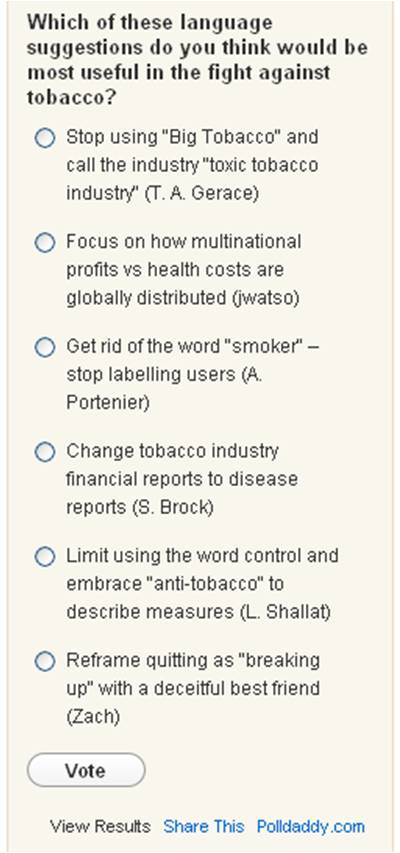Ruth Malone challenged Tobacco Control readers and contributors to devise “ideas for new language weapons in the word wars “. Given how many of you responded, this is something people are definitely thinking about. Using the right language is a crucial strategy in tobacco control. Sometimes the right language happens by a happy accident, other times it is a result of a carefully crafted media sound bite, and sometimes we just can’t seem to get the language right. So what do you think – does this shortlist of entries make the cut or do you have a better idea?
Vote in our poll – the winner gets a free subscription to their favourite journal, Tobacco Control. And, leave your feedback below if you have other ideas or suggestions about the language we use to combat tobacco use.
 Detailed shortlist of entries
Detailed shortlist of entries
Lezak Shallat: In my experience, there is a real clash of discourses between the language we use in tobacco control and the language we should be using to reach out to potential (and much needed) allies in the women’s movement. This raises a linguistic and ideological barrier that impedes greater collaboration. A case in point is the concept of tobacco “control”. For the TC movement, the word “control” encompasses a strategy to focus on a product and not its users (smokers) by setting limits that protect the rights of non-users. Within the TC movement, there is little talk of “anti-tobacco” measures or policies. This abbreviated terminology is reserved for headlines and journalists. Among feminists, however, the word “control” raises hives. It is located at the opposite end of the spectrum from autonomy over one’s body and the right to decide for oneself about work, education, reproductive life and more. This idea is central to feminism, and has been successfully exploited by the tobacco industry as a concept to sell cigarettes. The discourses clash. Control vs. protection; freedom to chose vs. informed choice; promoting vs. exploiting aspirations of “autonomy.” These words carry ideological subtexts that hinder greater dialogue with the feminists about how to address smoking as a women’s health issue.
Zach: Telling people who are trying to quit smoking to “think about it as if you are breaking up with your best friend who has been deceiving you for X amount of years.” This helps them understand the emotional struggle they will face with quitting. Framing the issue properly helps break down the mechanics of quitting or fighting the industry into its basic form, which makes it easier to generalize to other things in life, which helps us understand what we are up against.
Stewart Brock: I was reading a report just yesterday on BAT’s financial results and annual report, with lots of talk about growing markets in developing countries etc. I thought it would be good to produce an alternative article, changing the focus from financial issues to disease ones, while maintaining the style of a city story. So instead of the article reading: “The company reported that Africa and Asia delivered the best performance, with strong volume growth in Pakistan, Bangladesh, South Korea, Nigeria and the Gulf. ” it might read: “Strong volume growth in Pakistan, Bangladesh, South Korea, Nigeria and the Gulf should lead to increased levels of addiction with excellent prospects for lung cancer growth in future decades.”
Andrea Portenier: First, there is no such thing as a “smoker”. No one is born with a pack of Marlboros in their hands. Smoking is not innate. Breathing is. Using the word “smoker” creates the impression of an innate characteristic which is to be accorded certain rights. If we want to get rid of the impression that smoking is a right, it only makes sense, doesn’t it, to use language that dissolves the impression that it is. The inculcation through language that smoking is a state of being, rather than an activity, also can make it harder for someone to free themselves of their addiction. It is after all harder to quit being something than doing something. If every journal would make an editorial decision to not print this word, other than as a quote, we would go a long way towards reducing tobacco use.
Jwatso: We must understand that the multinational Tobacco companies are not really interested in the UK and Europe any more. Their markets are in India, Pakistan and China, etc. The new words need to be projected to the rulers of these nations, possibly via the UN.
1. If people purchase cigarettes from foreign multinationals, THE PROFITS are leaving the country.
2. However, the COSTS, in terms of health consequences remain the country.
Terence A. Gerace, Ed.M., M.A., Ph.D.: The terms Big Tobacco, tobacco industry, and major tobacco companies should be eliminated in favor of “toxic-tobacco companies” or “toxic-tobacco industry”. None of the former terms provides the true negative denotation that “toxic-tobacco companies” and “toxic-tobacco industry” do. Placing “Big” in front of Tobacco blunts tobacco’s negative associations. “Big” has a positive connotation as evidenced by McDonalds Corporation’s using “Big” in front of “Mac” and Frito-Lay placing “Big” before “Grab” to designate its large bag of snacks for individuals.
The original call for entries blog post can be read here.